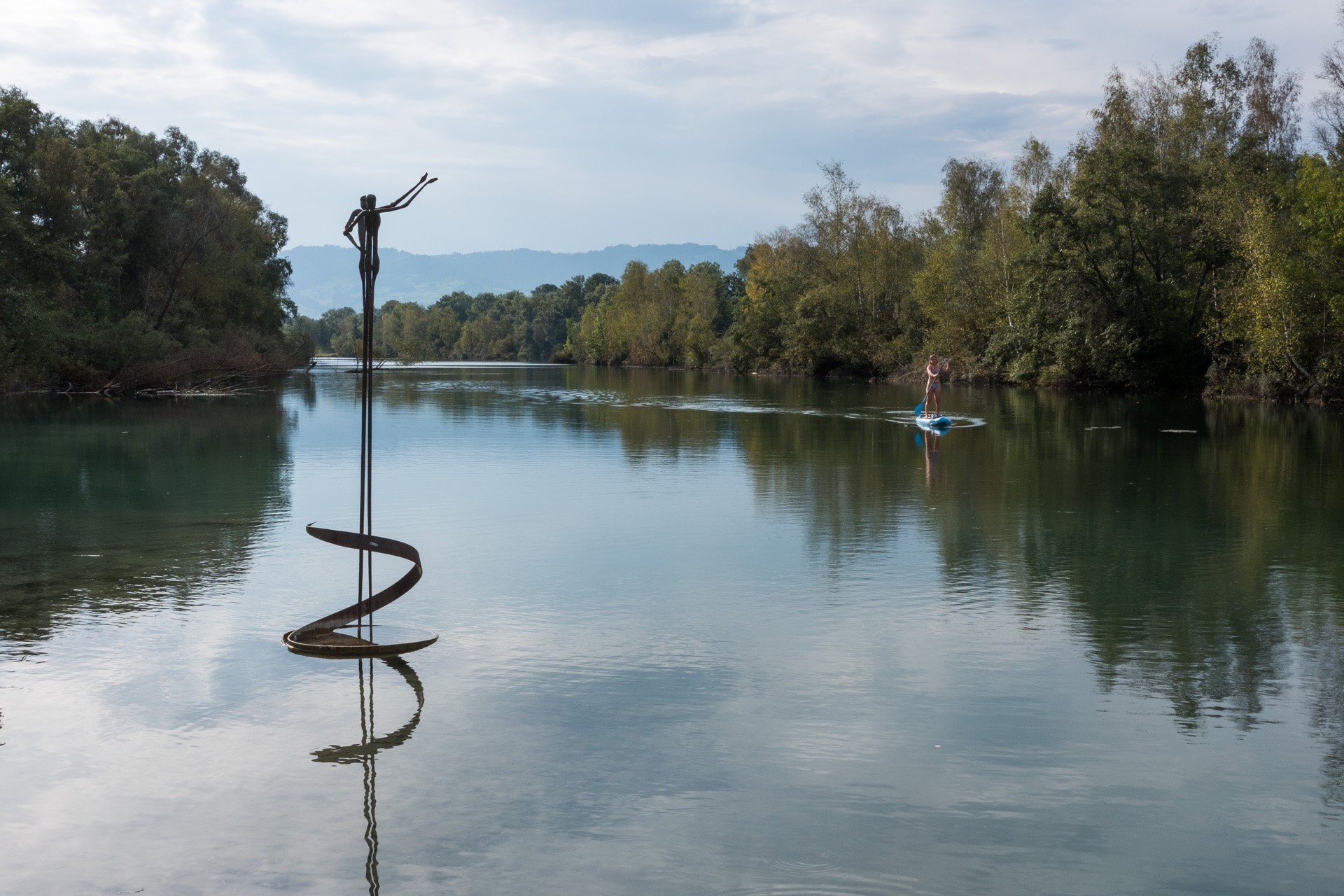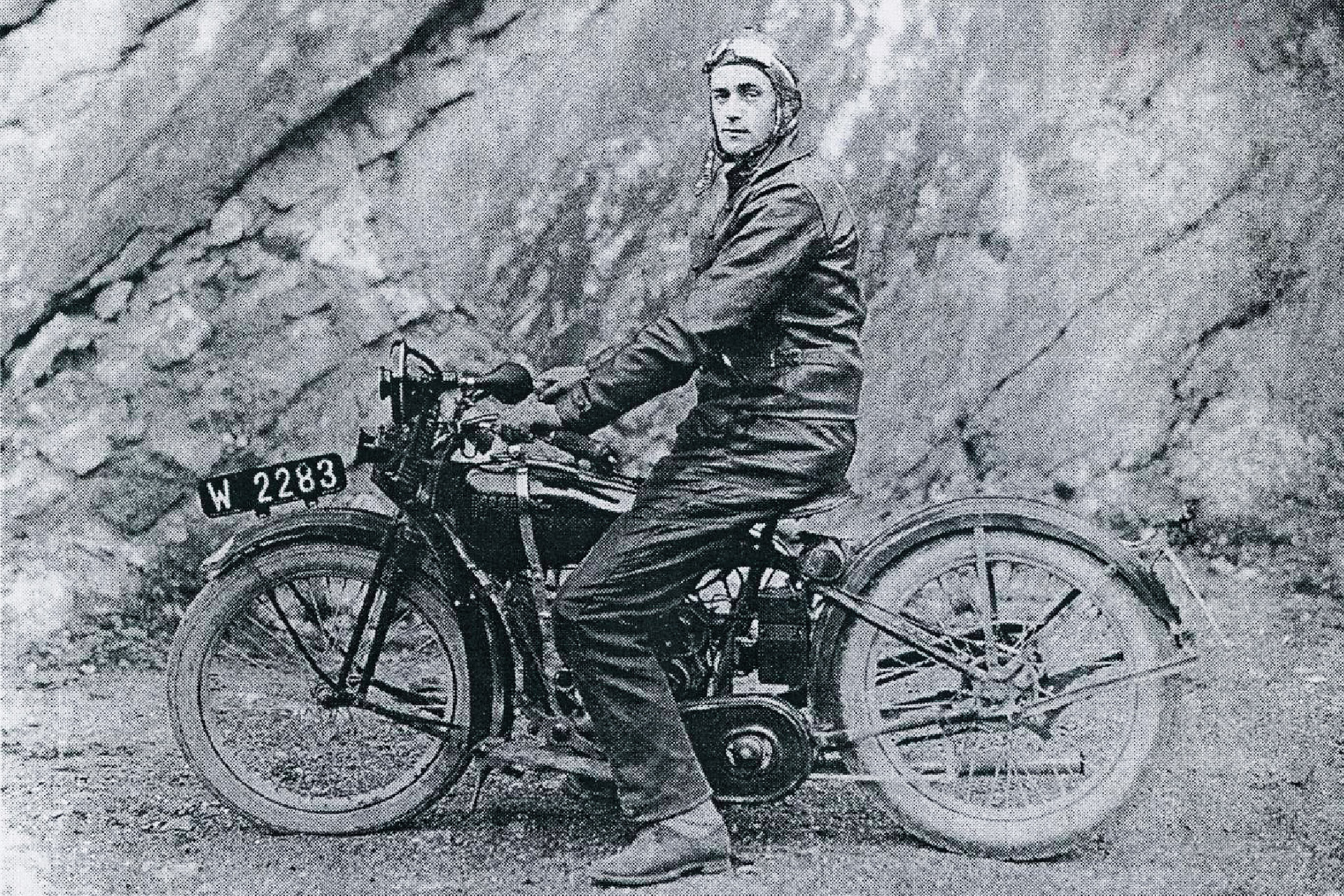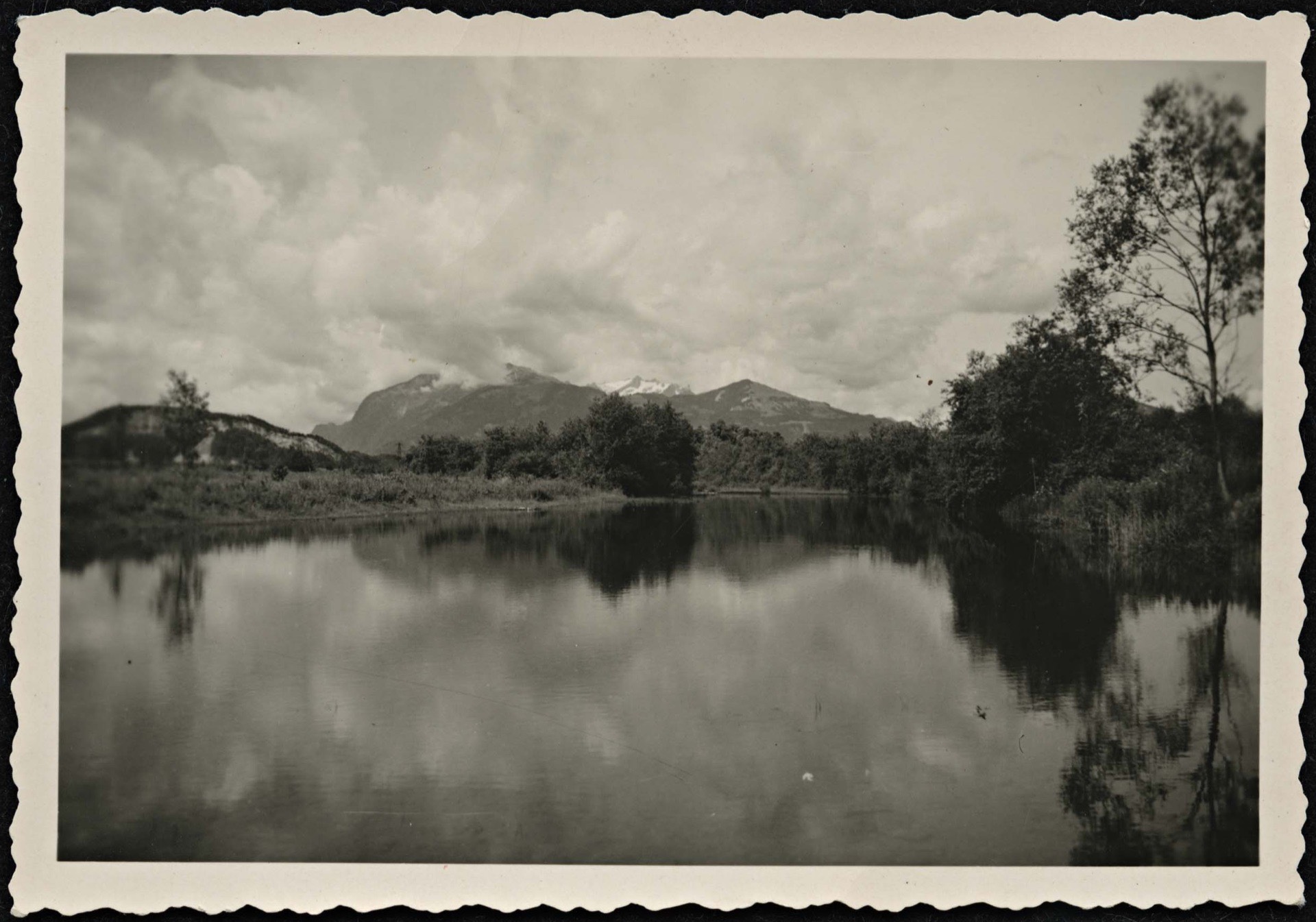Edmund Fleisch> Autumn 1938
32 Edmund Fleisch
“Thank God I was able to lie with a quick wit”. The escape helper Edmund Fleisch
Altach, Fall 1938
“I was an old smuggler. During the time when we young people were unemployed in Austria, we smuggled sugar and coffee across the border. And I was well known, well known in the area. Do you understand?”[1]
In 1991, Edmund Fleisch tells the Swiss historian Stefan Keller about his work as an escape helper at the border near Altach. In the first months after the so-called “Anschluss”, the refugees from Vienna were still sent across the border by the Gestapo itself after they were required to hand over all their belongings. Their expulsion and robbery were still the priority. The Vorarlberg innkeepers are instructed to report arriving Jews to the nearest customs office. And the district customs commissioner orders that no stay of more than three days be tolerated. But in late summer, not only the Swiss border police are reinforced, but the Nazi authorities also mercilessly intervene against escape attempts. Escape helpers like Edmund Fleisch are now indispensable for crossing the border illegally. Fleisch is given the nickname “Brother in Need”.
“And then they sent the people to me, right! And I took these people across the border by night and fog. – Well ... back then ... never again ... we were followed by the SS, my house was spied on ... under all circumstances ... And then I was summoned once to the Secret State Police in Bregenz, Römerstrasse, and I was there for three hours, and all three hours I was able to tell a quick-witted lie, thank God, otherwise they would have ... And from then on, of course, I had to be very careful. – You see, nobody dared to do it anymore because of the Gestapo.”
Edmund Fleisch is an unskilled worker in the embroidery industry; he is 28 years old and an experienced smuggler. He is not the only escape helper in the village. Rudolf Egle or Ludwig Gächter also help the persecuted across the border.[2] Fleisch's point of contact is the “Sonne” inn. The refugees arrive there. He is notified beforehand from St. Gall, mostly by Recha Sternbuch, who with her husband Isaac built up an active network to rescue Jewish refugees in 1938 – and by Willi Hutter, a greengrocer in Diepoldsau.
“Mostly from Mrs. Sternbuch. And from this Hutter. The people are with this Hutter also somehow ... I mean, they were in perfect accord. I couldn't know whether a few would come again tomorrow, and then I (...) was informed and took them away. And the others that I picked up in Landeck, in Ulm, that of course didn't go over here. People didn't dare to come here by train because the SS were checking in plainclothes. It was difficult for people to even get to Vorarlberg, to the border area.”
Fleisch also picks up refugees from Ulm or from Landeck with the help of a Hohenems cab driver named Beck. They, too, are taken across the border via the lock at the Altach public swimming pool. Only once does he meet Recha Sternbuch in person, at a meeting in Hohenems.
Not only Fleisch is interrogated by the police. Willi Hutter in Diepoldsau also has problems with the Swiss authorities. On May 12, 1939, his house is searched. Landjäger Butz makes a record:
“Our attention was particularly directed to written material that might relate to emigrant smuggling. In this regard, some incriminating material was found and confiscated from the stove in the living room. In the notebook marked ’General’, there are various Jewish names and records of sums of money. (...) Particularly incriminating are also the letters and the postcard addressed to Hutter by a certain ’Herbert’ from St. Gall (...) In the letter dated 23.11.1938 from Herbert it is mentioned that on Friday ’6 sacks of potatoes’ would arrive in Bludenz according to the timetable at 12.10, which would therefore have been November 25. On the following day, 26.11.1938, 6 newly arrived refugees who had illegally crossed the border at Diepoldsau also promptly arrived at the police command for registration.”[3]
In 1939, Edmund Fleisch finds work in Friedrichshafen as an iron lathe operator in an engine plant. Then he is drafted and serves five years as a soldier in Greece, Russia and Italy. After the war, he works as a bulldozer driver. He died at the age of 82 in 1992.
[1] Interview with Edmund Fleisch by Stefan Keller, October 28, 1991.
[2] Harald Walser, „Altach im Zeitalter der Diktaturen“, in: Rudolf Giesinger/Harald Walser (Hg.), Altach. Geschichte und Gegenwart. Bd. 1, Altach 1999, S. 223-236; Gernot Egger, „Ins Freie? Die vorarlbergisch-schweizerische Grenze 1933-1945“, in: Von Herren und Menschen. Verfolgung und Widerstand in Vorarlberg 1933-1945, Hg. Johann-August-Malin-Gesellschaft. Bregenz: Fink’s Verlag, 1985, S. 234-257.
[3] Stefan Keller, Grüningers Fall. Zurich 1993, p. 180f.
32 Edmund Fleisch
“Thank God I was able to lie with a quick wit”. The escape helper Edmund Fleisch
Altach, Fall 1938
“I was an old smuggler. During the time when we young people were unemployed in Austria, we smuggled sugar and coffee across the border. And I was well known, well known in the area. Do you understand?”[1]
In 1991, Edmund Fleisch tells the Swiss historian Stefan Keller about his work as an escape helper at the border near Altach. In the first months after the so-called “Anschluss”, the refugees from Vienna were still sent across the border by the Gestapo itself after they were required to hand over all their belongings. Their expulsion and robbery were still the priority. The Vorarlberg innkeepers are instructed to report arriving Jews to the nearest customs office. And the district customs commissioner orders that no stay of more than three days be tolerated. But in late summer, not only the Swiss border police are reinforced, but the Nazi authorities also mercilessly intervene against escape attempts. Escape helpers like Edmund Fleisch are now indispensable for crossing the border illegally. Fleisch is given the nickname “Brother in Need”.
“And then they sent the people to me, right! And I took these people across the border by night and fog. – Well ... back then ... never again ... we were followed by the SS, my house was spied on ... under all circumstances ... And then I was summoned once to the Secret State Police in Bregenz, Römerstrasse, and I was there for three hours, and all three hours I was able to tell a quick-witted lie, thank God, otherwise they would have ... And from then on, of course, I had to be very careful. – You see, nobody dared to do it anymore because of the Gestapo.”
Edmund Fleisch is an unskilled worker in the embroidery industry; he is 28 years old and an experienced smuggler. He is not the only escape helper in the village. Rudolf Egle or Ludwig Gächter also help the persecuted across the border.[2] Fleisch's point of contact is the “Sonne” inn. The refugees arrive there. He is notified beforehand from St. Gall, mostly by Recha Sternbuch, who with her husband Isaac built up an active network to rescue Jewish refugees in 1938 – and by Willi Hutter, a greengrocer in Diepoldsau.
“Mostly from Mrs. Sternbuch. And from this Hutter. The people are with this Hutter also somehow ... I mean, they were in perfect accord. I couldn't know whether a few would come again tomorrow, and then I (...) was informed and took them away. And the others that I picked up in Landeck, in Ulm, that of course didn't go over here. People didn't dare to come here by train because the SS were checking in plainclothes. It was difficult for people to even get to Vorarlberg, to the border area.”
Fleisch also picks up refugees from Ulm or from Landeck with the help of a Hohenems cab driver named Beck. They, too, are taken across the border via the lock at the Altach public swimming pool. Only once does he meet Recha Sternbuch in person, at a meeting in Hohenems.
Not only Fleisch is interrogated by the police. Willi Hutter in Diepoldsau also has problems with the Swiss authorities. On May 12, 1939, his house is searched. Landjäger Butz makes a record:
“Our attention was particularly directed to written material that might relate to emigrant smuggling. In this regard, some incriminating material was found and confiscated from the stove in the living room. In the notebook marked ’General’, there are various Jewish names and records of sums of money. (...) Particularly incriminating are also the letters and the postcard addressed to Hutter by a certain ’Herbert’ from St. Gall (...) In the letter dated 23.11.1938 from Herbert it is mentioned that on Friday ’6 sacks of potatoes’ would arrive in Bludenz according to the timetable at 12.10, which would therefore have been November 25. On the following day, 26.11.1938, 6 newly arrived refugees who had illegally crossed the border at Diepoldsau also promptly arrived at the police command for registration.”[3]
In 1939, Edmund Fleisch finds work in Friedrichshafen as an iron lathe operator in an engine plant. Then he is drafted and serves five years as a soldier in Greece, Russia and Italy. After the war, he works as a bulldozer driver. He died at the age of 82 in 1992.
[1] Interview with Edmund Fleisch by Stefan Keller, October 28, 1991.
[2] Harald Walser, „Altach im Zeitalter der Diktaturen“, in: Rudolf Giesinger/Harald Walser (Hg.), Altach. Geschichte und Gegenwart. Bd. 1, Altach 1999, S. 223-236; Gernot Egger, „Ins Freie? Die vorarlbergisch-schweizerische Grenze 1933-1945“, in: Von Herren und Menschen. Verfolgung und Widerstand in Vorarlberg 1933-1945, Hg. Johann-August-Malin-Gesellschaft. Bregenz: Fink’s Verlag, 1985, S. 234-257.
[3] Stefan Keller, Grüningers Fall. Zurich 1993, p. 180f.



